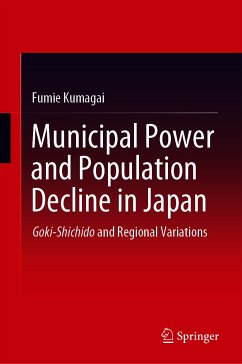This book provides an insightful sociological study of the declining Japanese population, using statistical analysis to establish the significance of municipal power using demographic data on national, regional, prefectural and municipal levels. Penned by one of Japan's eminent sociologists, it provides a quantitative characterization of population decline in Japan with a focus on regional variation, and identifies the principal explanatory factors through GPI statistical software tools such as G-census and EvaCva, within a historical perspective. Furthermore, it offers a qualitative assessment of what constitutes 'municipal power' as this relates to regional/local revitalization as a means of addressing municipal population decline. Using Goki Shichido as a theoretical framework, this book pays special attention to municipal variations within the same prefecture, presenting a completely unique approach. In combining these two dimensions of analyses, the book successfully reveals the impact of municipal power and socio-cultural identity of social capital in the region, from both quantitative and qualitative perspectives at the municipal level. Demography issues in Japan have been receiving increasing attention among researchers given the growing number of declining populations in developed countries, in tandem with rapid aging and low fertility trends. Providing an original and unique contribution to regional population analysis in the fields of regional demography, historical demography and regional population policy, this book shows that the revitalization of the community is vital if Japan is to increase its population, so as to renew a community 'raison d'être'. The book is of interest to scholars of Asian studies more broadly, and to sociologists, demographers, and policymakers interested in population studies, specifically.
"Providing an informative and vivid overview of the demographic situation ofJapan, the author offers excellent suggestions for effective regional policy in confronting a shrinking society. This book presents a unique analysis of the regional variations on small municipal levels, with demographic variables, social indicators and historical identities. An original contribution to regional population analysis in the fields of regional population policy, regional demography and historical demography." - Toshihiko Hara, Professor Emeritus, Sapporo City University
Hinweis: Dieser Artikel kann nur an eine deutsche Lieferadresse ausgeliefert werden.
"Providing an informative and vivid overview of the demographic situation ofJapan, the author offers excellent suggestions for effective regional policy in confronting a shrinking society. This book presents a unique analysis of the regional variations on small municipal levels, with demographic variables, social indicators and historical identities. An original contribution to regional population analysis in the fields of regional population policy, regional demography and historical demography." - Toshihiko Hara, Professor Emeritus, Sapporo City University
Dieser Download kann aus rechtlichen Gründen nur mit Rechnungsadresse in A, B, BG, CY, CZ, D, DK, EW, E, FIN, F, GR, HR, H, IRL, I, LT, L, LR, M, NL, PL, P, R, S, SLO, SK ausgeliefert werden.
Hinweis: Dieser Artikel kann nur an eine deutsche Lieferadresse ausgeliefert werden.
Es gelten unsere Allgemeinen Geschäftsbedingungen: www.buecher.de/agb
Impressum
www.buecher.de ist ein Internetauftritt der buecher.de internetstores GmbH
Geschäftsführung: Monica Sawhney | Roland Kölbl | Günter Hilger
Sitz der Gesellschaft: Batheyer Straße 115 - 117, 58099 Hagen
Postanschrift: Bürgermeister-Wegele-Str. 12, 86167 Augsburg
Amtsgericht Hagen HRB 13257
Steuernummer: 321/5800/1497
USt-IdNr: DE450055826
Bitte wählen Sie Ihr Anliegen aus.
Rechnungen
Retourenschein anfordern
Bestellstatus
Storno









